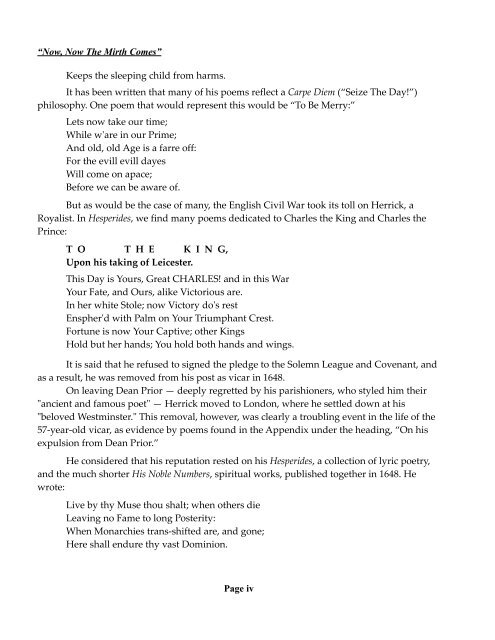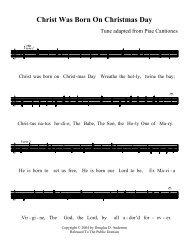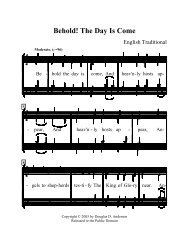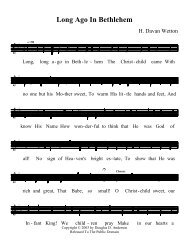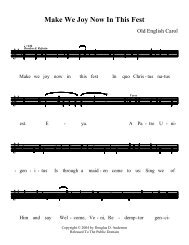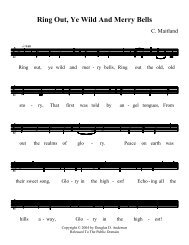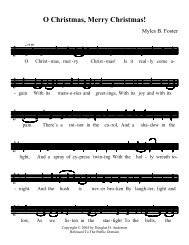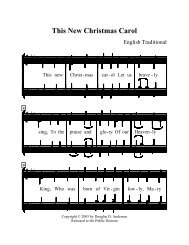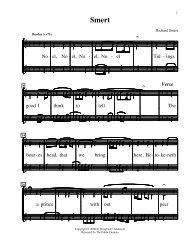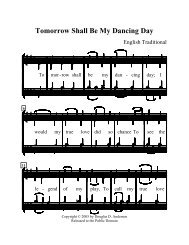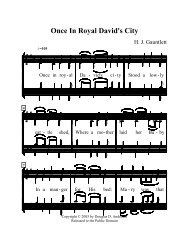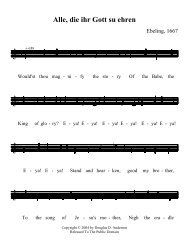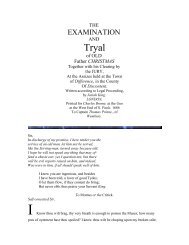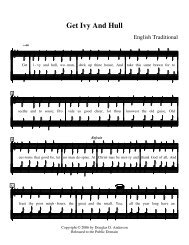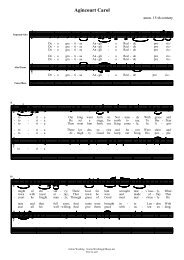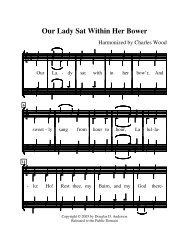Now, Now, The Mirth Comes - The Hymns and Carols of Christmas
Now, Now, The Mirth Comes - The Hymns and Carols of Christmas
Now, Now, The Mirth Comes - The Hymns and Carols of Christmas
You also want an ePaper? Increase the reach of your titles
YUMPU automatically turns print PDFs into web optimized ePapers that Google loves.
“<strong>Now</strong>, <strong>Now</strong> <strong>The</strong> <strong>Mirth</strong> <strong>Comes</strong>”<br />
Keeps the sleeping child from harms.<br />
It has been written that many <strong>of</strong> his poems reflect a Carpe Diem (“Seize <strong>The</strong> Day!”)<br />
philosophy. One poem that would represent this would be “To Be Merry:”<br />
Lets now take our time;<br />
While w'are in our Prime;<br />
And old, old Age is a farre <strong>of</strong>f:<br />
For the evill evill dayes<br />
Will come on apace;<br />
Before we can be aware <strong>of</strong>.<br />
But as would be the case <strong>of</strong> many, the English Civil War took its toll on Herrick, a<br />
Royalist. In Hesperides, we find many poems dedicated to Charles the King <strong>and</strong> Charles the<br />
Prince:<br />
T O T H E K I N G,<br />
Upon his taking <strong>of</strong> Leicester.<br />
This Day is Yours, Great CHARLES! <strong>and</strong> in this War<br />
Your Fate, <strong>and</strong> Ours, alike Victorious are.<br />
In her white Stole; now Victory do's rest<br />
Enspher'd with Palm on Your Triumphant Crest.<br />
Fortune is now Your Captive; other Kings<br />
Hold but her h<strong>and</strong>s; You hold both h<strong>and</strong>s <strong>and</strong> wings.<br />
It is said that he refused to signed the pledge to the Solemn League <strong>and</strong> Covenant, <strong>and</strong><br />
as a result, he was removed from his post as vicar in 1648.<br />
On leaving Dean Prior — deeply regretted by his parishioners, who styled him their<br />
"ancient <strong>and</strong> famous poet" — Herrick moved to London, where he settled down at his<br />
"beloved Westminster." This removal, however, was clearly a troubling event in the life <strong>of</strong> the<br />
57-year-old vicar, as evidence by poems found in the Appendix under the heading, “On his<br />
expulsion from Dean Prior.”<br />
He considered that his reputation rested on his Hesperides, a collection <strong>of</strong> lyric poetry,<br />
<strong>and</strong> the much shorter His Noble Numbers, spiritual works, published together in 1648. He<br />
wrote:<br />
Live by thy Muse thou shalt; when others die<br />
Leaving no Fame to long Posterity:<br />
When Monarchies trans-shifted are, <strong>and</strong> gone;<br />
Here shall endure thy vast Dominion.<br />
Page iv


